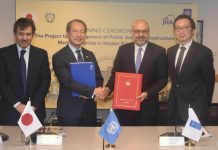ISLAMABAD, JUN 1 (DNA) – COMSTECH is organizing a 3-day advanced training course on “how to establish halal products testing laboratory”, in collaboration with International Center for Chemical and Biological Sciences (ICCBS) Karachi, and Pakistan National Accreditation Council (PNAC) during June 8 – 10, 2021, at COMSTECH Secretariat, Islamabad.
Federal Minister for Science & Technology, Mr. Shibli Faraz, will grace the occasion as the chief guest and Mr. İhsan ÖVÜT, Secretary General, The Standards and Metrology Institute for Islamic Countries (SMIIC), Turkey, will address the inaugural session.
According to the global Islamic finance report, the global halal industry is estimated to be worth around USD2.3 trillion growing at an estimated annual rate of 20%, the industry is valued at about USD560 billion a year.
In view of the diversity of several products, including processed food and other items of daily use in the present day, authentication and confirmation of their Halal nature is a growing challenge globally.
Beside the environmental contaminants, both biological and chemical, addition of non-halal ingredients, which is prohibited for Muslims, is a matter of concern. In recent years, awareness about Halal food and other products has increased due to the cross contamination of several industrial products in our daily life.
However, with increasing globalization, many Islamic countries import these products or ingredients from places where Islamic injunctions are not observed. It is therefore, imperative for the Muslim countries to establish Halal testing laboratories which will ensure the Halal status of the consumer products.
The objectives of the training are to impart knowledge on how to establish a research and development laboratory for the investigation / analysis of non-halal ingredients in food, cosmetics and pharmaceuticals by providing hands-on training on instruments involved in non-halal ingredients testing.
To explain the procedure for the testing of most common non-halal ingredients such as detection of alcohol, pork meet, and pork fat (Lard) and genetically modified organisms (GMOs), along with learning the procedure for the laboratory accreditation for ISO 17025 and OIC/SMIIC 35:2020, and to have understanding of how to successfully participate in international proficiency testing.
The course is designed for scientists and research scholars and technicians from OIC member states, involved in food testing and research to participate and acquire state-of-the-art knowledge to establish halal products testing laboratories in their countries.=DNA
==========












